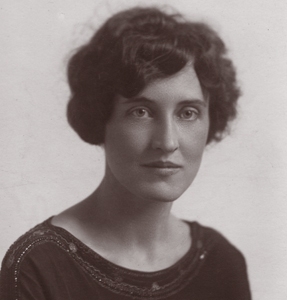Profile

Martha Guernsey Colby
Birth:
1899
Death:
1952
Training Location(s):
PhD, University of Michigan (1922)
Primary Affiliation(s):
University of Michigan (1921-1950)
Other Media:
Archival Collection
Career Focus:
Child development; music perception
Biography
Martha Guernsey Colby was born February 22, 1899. After graduating from high school in Montpelier, Idaho, at the age of fifteen she spent one year each at the University of Utah and at the University of Michigan. The following year she moved to Ogden, Utah, where she taught elementary school and music. She then returned to the University of Michigan for graduate studies, during which time she was an assistant in experimental psychology at the university. Her mentor was a former student of E. B. Titchener's, theoretician and historian W. B. Pillsbury. Colby obtained her doctoral degree from the University of Michigan in 1922, only the second woman to obtain a doctoral degree from the university.
Following the completion of her graduate studies, Colby married physicist Walter F. Colby, who became a professor at the University of Michigan. Colby remained at the University of Michigan, alongside her husband, as assistant professor of social science research from 1921 until 1950, never advancing in rank. Over the course of her career, her psychological research was in the area of child development, first on musical ability and later on social attitudes toward exceptional children.
During her time at the University of Michigan, Colby also spent time abroad, holding fellowships at the University of Vienna from 1927 to 1928 and from 1929 to 1930, the latter position made possible through a Laura Spelman Rockefeller fellowship. These fellowships allowed her to conduct research at the Institute of Psychology in Vienna and to become friends with Karl and Charlotte Bühler. While abroad Colby also worked with the gestaltists Köhler and Wertheimer in Berlin.
Colby's career in psychology came to an end when she resigned from the University of Michigan in 1950, to accompany her husband to Washington, DC where he had accepted a position at the Atomic Energy Commission (AEC). In 1952, the couple travelled to Europe for Walter Colby's work with the AEC. While driving on a mountain road in Greece the couple's car went off the road, killing Martha Guernsey Colby.
by Jacy L. Young (2010)
To cite this article, see Credits
Selected Works
By Martha Guernsey Colby
Colby, M. G. (1935). Instrumental reproduction of melody by preschool children. Pedagogical Seminary and Journal of Genetic Psychology, 47, 413-430.
Colby, M. G. (1944). The early development of social attitudes toward exceptional children. Pedagogical Seminary and Journal of Genetic Psychology, 64, 105-110.
Guernsey, M. (1928). The role of consonance and dissonance in music. American Journal of Psychology, 40, 173-204.
About Martha Guernsey Colby
Colby, Martha Guernsey (1899-1952). (2000). In M. B. Ogilvie, & J. D. Harvey (Eds.), The biographical dictionary of women in science: Pioneering lives from ancient times to the mid-20th century (vol. 1, pp. 279). New York: Routledge.

Martha Guernsey Colby
Birth:
1899
Death:
1952
Training Location(s):
PhD, University of Michigan (1922)
Primary Affiliation(s):
University of Michigan (1921-1950)
Other Media:
Archival Collection
Career Focus:
Child development; music perception
Biography
Martha Guernsey Colby was born February 22, 1899. After graduating from high school in Montpelier, Idaho, at the age of fifteen she spent one year each at the University of Utah and at the University of Michigan. The following year she moved to Ogden, Utah, where she taught elementary school and music. She then returned to the University of Michigan for graduate studies, during which time she was an assistant in experimental psychology at the university. Her mentor was a former student of E. B. Titchener's, theoretician and historian W. B. Pillsbury. Colby obtained her doctoral degree from the University of Michigan in 1922, only the second woman to obtain a doctoral degree from the university.
Following the completion of her graduate studies, Colby married physicist Walter F. Colby, who became a professor at the University of Michigan. Colby remained at the University of Michigan, alongside her husband, as assistant professor of social science research from 1921 until 1950, never advancing in rank. Over the course of her career, her psychological research was in the area of child development, first on musical ability and later on social attitudes toward exceptional children.
During her time at the University of Michigan, Colby also spent time abroad, holding fellowships at the University of Vienna from 1927 to 1928 and from 1929 to 1930, the latter position made possible through a Laura Spelman Rockefeller fellowship. These fellowships allowed her to conduct research at the Institute of Psychology in Vienna and to become friends with Karl and Charlotte Bühler. While abroad Colby also worked with the gestaltists Köhler and Wertheimer in Berlin.
Colby's career in psychology came to an end when she resigned from the University of Michigan in 1950, to accompany her husband to Washington, DC where he had accepted a position at the Atomic Energy Commission (AEC). In 1952, the couple travelled to Europe for Walter Colby's work with the AEC. While driving on a mountain road in Greece the couple's car went off the road, killing Martha Guernsey Colby.
by Jacy L. Young (2010)
To cite this article, see Credits
Selected Works
By Martha Guernsey Colby
Colby, M. G. (1935). Instrumental reproduction of melody by preschool children. Pedagogical Seminary and Journal of Genetic Psychology, 47, 413-430.
Colby, M. G. (1944). The early development of social attitudes toward exceptional children. Pedagogical Seminary and Journal of Genetic Psychology, 64, 105-110.
Guernsey, M. (1928). The role of consonance and dissonance in music. American Journal of Psychology, 40, 173-204.
About Martha Guernsey Colby
Colby, Martha Guernsey (1899-1952). (2000). In M. B. Ogilvie, & J. D. Harvey (Eds.), The biographical dictionary of women in science: Pioneering lives from ancient times to the mid-20th century (vol. 1, pp. 279). New York: Routledge.
